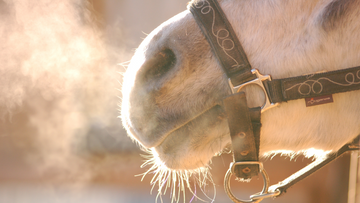One of the big questions facing horse owners is whether to vaccinate their equines against strangles. The decision includes many factors, including the risk of strangles exposure, the preventive measures implemented in the barn, and personal considerations such as the financial implications and emotional toll of dealing with the disease. Understanding the nature of the disease and the efficacy of the strangles vaccine for horses can help you make an informed decision.
Understanding Strangles
Strangles, also known as horse distemper, is caused by the bacterium Streptococcus. This highly contagious disease primarily affects the upper respiratory tract of horses, ponies, and donkeys. It spreads through contact between animals or indirectly via contaminated objects such as blankets, halters, buckets, people, or environments.
Assessing the Risk of Strangles

Assessing the risk of strangles exposure is crucial for determining whether the vaccine is necessary for your horse. A huge factor is your horse’s living environment. Private horses kept at home typically have a low risk of contracting Strangles, although human interaction remains a potential transmission source. Some boarding barns and stables have screening protocols for new arrivals. This type of facility may pose a medium risk, mainly if horses attend events or interact with outside animals.
Medium to large barns without screening protocols may pose a high risk for strangles. These barns typically have frequent turnover of horses, and without screening, can contribute to a high risk of Strangles introduction. If your horse lives at this type of facility, it may be a good idea to consider the strangles vaccine for horses. Horses that travel outside of the barn for shows and events have a much higher risk of contracting this disease.
Effectiveness of Vaccination
Veterinarians recommend the strangles vaccine for horses in environments with persistent Strangles problems or high exposure risks. While the vaccine doesn’t provide absolute immunity, it significantly reduces the severity of clinical signs. In vaccinated horses exposed to Strangles, around 50% show no symptoms, while others exhibit mild signs with quicker recovery times compared to unvaccinated counterparts.
Vaccination Protocol and Safety
The vaccination protocol typically involves two initial doses administered four weeks apart, followed by boosters annually, depending on the risk level. The vaccine is administered intranasally. While some horses may experience temporary swelling or mild fever post- vaccination, adverse reactions are rare. This vaccine cannot be given intramuscularly.
Considerations During Outbreaks
During a Strangles outbreak, caution is advised regarding vaccination. Vaccinating horses for the first time during an outbreak is not recommended due to potential adverse reactions. Instead, horses with prior vaccinations should receive booster shots to bolster their immunity. The decision to vaccinate against Strangles depends on individual circumstances and risk assessments.
While vaccination doesn’t eliminate the risk entirely, it substantially mitigates the severity of the disease. Combined with effective management practices and biosecurity measures, vaccination offers a robust defense against Strangles outbreaks. You should consult with your veterinarians to devise an appropriate vaccination strategy tailored to their horse’s needs and the prevailing conditions in their environment.






















